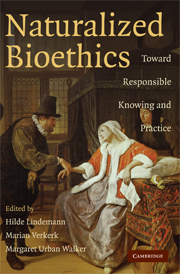Book contents
- Frontmatter
- Contents
- Contributors
- Acknowledgments
- Naturalized Bioethics
- Introduction: Groningen Naturalism in Bioethics
- I RESPONSIBLE KNOWING
- II RESPONSIBLE PRACTICE
- 7 Motivating Health: Empathy and the Normative Activity of Coping
- 8 Economies of Hope in a Period of Transition: Parents in the Time Leading Up to Their Child's Liver Transplantation
- 9 Consent as a Grant of Authority: A Care Ethics Reading of Informed Consent
- 10 Professional Loving Care and the Bearable Heaviness of Being
- 11 Ideal Theory Bioethics and the Exclusion of People with Severe Cognitive Disabilities
- 12 Epilogue: Naturalized Bioethics in Practice
- Bibliography
- Index
8 - Economies of Hope in a Period of Transition: Parents in the Time Leading Up to Their Child's Liver Transplantation
Published online by Cambridge University Press: 05 June 2012
- Frontmatter
- Contents
- Contributors
- Acknowledgments
- Naturalized Bioethics
- Introduction: Groningen Naturalism in Bioethics
- I RESPONSIBLE KNOWING
- II RESPONSIBLE PRACTICE
- 7 Motivating Health: Empathy and the Normative Activity of Coping
- 8 Economies of Hope in a Period of Transition: Parents in the Time Leading Up to Their Child's Liver Transplantation
- 9 Consent as a Grant of Authority: A Care Ethics Reading of Informed Consent
- 10 Professional Loving Care and the Bearable Heaviness of Being
- 11 Ideal Theory Bioethics and the Exclusion of People with Severe Cognitive Disabilities
- 12 Epilogue: Naturalized Bioethics in Practice
- Bibliography
- Index
Summary
“I wonder how many miles I've fallen by this time?” she said aloud. “I must be getting somewhere near the centre of the earth. Let me see: that would be four thousand miles down, I think — ” (for, you see, Alice had learnt several things of this sort in her lessons in the school-room, and though this was not a very good opportunity for showing off her knowledge, as there was no one to listen to her, still it was good practice to say it over).
— Lewis Carroll, Alice's Adventures in WonderlandWhen infant patients and their parents tumble into the world of liver transplantation, they are not as lighthearted and curious as Alice — the hospital is not a Wonderland. However, they do discover, as she does, that they are leaving the ordinary life they shared behind. The geography lessons that Alice learned in school have become somewhat pointless; they do not seem to tell her where she is. The same happens with family habits and self-understandings when a child is threatened by disease and the need for liver transplantation. In retrospective interviews with parents about their child's liver transplantation, the time leading up to the transplantation is depicted as a period of transition. Their child's threatening disease has abruptly interrupted their lives, and indeed, many parents indicate that somehow their life stopped in this period: “Your life comes to a halt,” as one of our respondents put it.
- Type
- Chapter
- Information
- Naturalized BioethicsToward Responsible Knowing and Practice, pp. 162 - 181Publisher: Cambridge University PressPrint publication year: 2008
- 1
- Cited by



